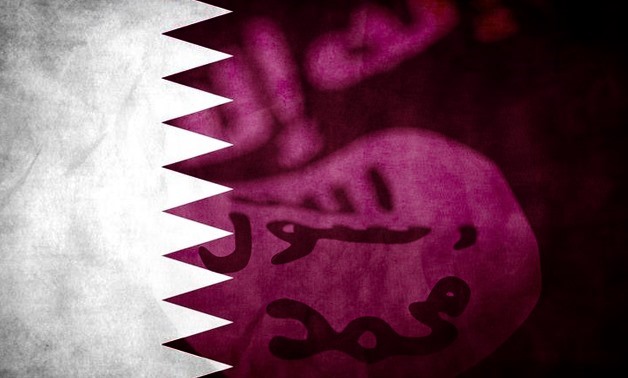
Qatar Turmoil – designed photo
CAIRO – 18 June 2017: Since Arab and Gulf countries took the step to sever their relations with Qatar over its support to terrorism, Doha has been trying to disclaim the accusation through statements and diplomatic missions, trying to sugar-coat its policies and cover up its vicious plans.
Despite several visits to European countries by Qatari Foreign Minister Mohamed Ben Abdel Rahman Al-Thani and statements circulated by the government, Qatar has failed to disprove its support for terrorist organizations, as acknowledged by most countries, including the U.S.
In a memorandum sent by the Qatari Foreign Ministry to its embassies and diplomatic missions, the small state claimed that Saudi Arabia and the United Arab Emirates have escalated the crisis and intentionally launched a campaign against Qatar to associate it with terrorism, in an attempt to deceive public opinion and redirect attention from Qatar’s actual support to terrorist groups.
The rich oil country also followed a plan, using extensive funds, to control media outlets in some countries and make them portray it as a democratic state, among a group of unjust regimes.
Former PM reveals the contradiction and deception in Qatari policies
After four years away from political life, former Qatari Prime Minister and Minister of Foreign Affairs Hamad bin Jassim Al-Thani and the architect of Qatari foreign policy for over two decades, appeared in an interview with BPS in New York, on Monday, to reveal the deception in Qatari policies manifest in a number of contradictory statements.
In one statement, Bin Jassim denied any ties between Iran and Qatar, only to go back and state that the former has strong connections with decision makers in Doha.
While Doha has been denying any ties with Iran, Bin Jassim had previously stated, while serving as foreign minister in 2013, that Doha must have a good relation with the latter.
In 2010, Bin Jassim met with Iranian President Mahmoud Ahmadinejad in Tehran and agreed to boost regional security cooperation. “Cooperation between Iran and Qatar can guarantee security and stability in the region,” Bin Jassim said.
As for Qatari ties with the outlawed Muslim Brotherhood, Qatar’s current foreign minister, Abdel Rahman Al-Thani, stated in a TV interview last week that the Brotherhood is not linked to terrorism, calling on Arab and Gulf states to come up with evidence to support their claims.
“We dealt with the Brotherhood members when they assumed the government in Egypt, and when they were removed, Qatar was the first to support the current Egyptian regime,” Bin Jassim claimed in the interview.
Gaining the sympathy of the West
Qatar has been trying to gain the sympathy of the west by calling the Arab countries’ isolation a “blockade,” which appeared clearly in Bin Jassim’s interview.
Media deception
The Qatari regime has been using media outlets as a soft power tool to pursue its agenda, especially following the decision taken by Arab and Gulf states.
In addition to the Qatari-owned channel Al Jazeera, which has been hosting members of radical groups and supporting extremist thoughts, Qatar has used social media, electronic spying and online tools to deceive public opinion and disseminate false information.
There is also a Twitter campaign, launched by Qatar, to spread rumors about Saudi Arabia, Egypt and UAE.
Failed visits to Europe
Qatar’s foreign minister has visited several European cities since the isolation, including London, Paris, Berlin, Moscow and Brussels, to convince them that Qatar does not fund terrorism and that it is ready to resolve the crisis through dialogue.
The Qatari diplomat stressed that his country has nothing to offer until it knows the real accusations that prompted the isolation measures.
Several Arab and Gulf states announced severing diplomatic ties with Qatar early June, over its support for terrorism, resulting in several economic, political and diplomatic measures that ended up isolating the small Gulf state and pushed it to use its deception tools to deal with the crisis.

Comments
Leave a Comment